

GMO: Something's Fishy in China. GMO: Something's Fishy in China By Robert Huebscher January 17, 2012 A wide gulf separates the two most prominent views regarding China’s future.
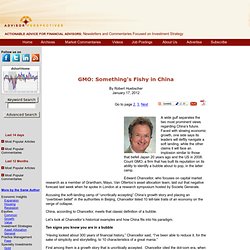
Faced with slowing economic growth, one side says its leaders will deftly navigate a soft landing, while the other claims it will face an implosion similar to those that befell Japan 20 years ago and the US in 2008. Count GMO, a firm that has built its reputation on its ability to identify a bubble about to pop, in the latter camp. Edward Chancellor, who focuses on capital market research as a member of Grantham, Mayo, Van Otterloo’s asset allocation team, laid out that negative forecast last week when he spoke in London at a research symposium hosted by Societe Generale. The Reasons For China's Imminent Bust.
Guest Post via ChrisMartenson.com The global dominant narrative about China is wrong, claims Gordon Chang.
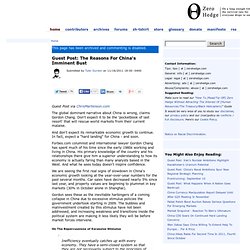
Don't expect it to be the 'pocketbook of last resort' that will rescue world markets from their current malaise. And don't expect its remarkable economic growth to continue. In fact, expect a "hard landing" for China - and soon. Forbes.com columnist and international lawyer Gordon Chang has spent much of his time since the early 1980s working and living in China. 10 Signs of Speculative Mania in China.
China’s housing bubble: New evidence. For a while now, analysts have been arguing there is a bubble in China’s property market. Using records from 35 major cities this column finds evidence of a housing bubble. It compares house prices to cointegrated fundamentals and finds that property in China is in general overvalued by around 20% – and even more so in the boom towns. For many observers, the Chinese economy has been spurred by a bubble in the real-estate market, probably driven by the fiscal stimulus package and massive credit expansion (Nicolas 2009). For example, the stock of loans increased by more than 50% since the end of 2008. In reaction to the global crisis, the government urged banks to increase lending (Cova et al. 2010).
There are several indications that the market might have overheated in recent years. To dampen the evolution, the People’s Bank of China has increased its nominal interest rate. Ponzi in Peking - Forbes.com. 'BMW town' crashes in pyramid fraud. Chinese Quest for Shortcut to Greatness. He Chinese economy must be getting out of control, because the Chinese government is doing the unthinkable: It is desperately trying to put the brakes on the economy.
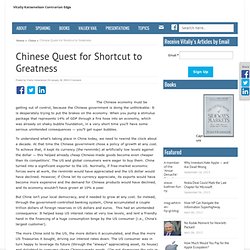
When you pump a stimulus package that represents 14% of GDP through a fire hose into an economy, which was already on shaky bubble foundation, in a very short time you’ll have some serious unintended consequences — you’ll get super bubbles. To understand what’s taking place in China today, we need to rewind the clock about a decade. At that time the Chinese government chose a policy of growth at any cost.
To achieve that, it kept its currency (the renminbi) at artificially low levels against the dollar — this helped already cheap Chinese-made goods become even cheaper than its competitors’. The US and global consumers were eager to buy them. But China isn’t your local democracy, and it needed to grow at any cost. Systemic Fraud In China? China's high growth rates have encouraged foreign investment, which have in turn helped fund China's incredible growth.
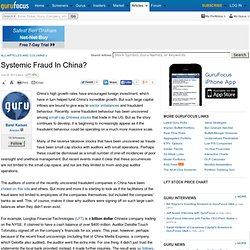
But such large capital inflows are bound to give way to sector imbalances and fraudulent behaviour. Recently, some fraudulent behaviour has been uncovered among small-cap Chinese stocks that trade in the US. But as the story continues to develop, it is beginning to increasingly appear as if the fraudulent behaviour could be operating on a much more massive scale. China’s Ghost Cities. The following video is the first of the great series on China’s ghost cities that Bloomberg is running this week.

Getting China right is key to your P&L and the direction of many markets, including emerging equities and commodities. We’re grappling with who financed these cities, who is holding the paper, and how were they financed. Recall China’s massive money supply growth and credit expansion which funded the country’s stimulus after the 2007-8 financial collapse. Our basic assumptions may be wrong, such as time horizon and holding period, and Adam Johnson does a good job covering these, but this is one issue that keeps us up at night and we won’t rest until we’re comfortable with a good working understanding of what is going “over there.”
China faces social unrest from housing woes - Emerging Markets Report. By Chris Oliver, MarketWatch Reuters A laborer works at a construction site for new houses in Huaxi, China.
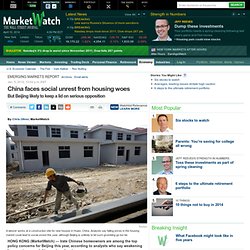
Analysts say falling prices in the housing market could lead to social unrest this year, although Beijing is unlikely to let such grumbling go too far. HONG KONG (MarketWatch) — Irate Chinese homeowners are among the top policy concerns for Beijing this year, according to analysts who say weakening house prices are stoking serious tensions. Hidden Losses And Little Reform: China May Be Slowing More Than You Think. In his latest Email review, Michael Pettis at China Financial Markets discusses financial reform (actually the lack thereof in China), as well as an observation on China's Growth.
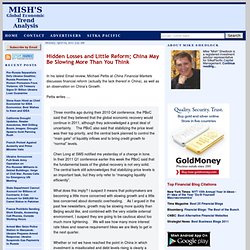
Pettis writes .... Three months ago during their 2010 Q4 conference, the PBoC said that they believed that the global economic recovery would continue in 2011, although they acknowledged a great deal of uncertainty. The PBoC also said that stabilizing the price level was their top priority, and the central bank planned to control the “main gate” of liquidity inflows and to bring credit growth to “normal” levels.
China's Housing Bust: A Potentially Devastating Blind Side In 2012. As the world’s attention focuses on the death of Kim Jong Il and shorts keep piling up in the Euro, China’s real estate bubble appears to have finally burst.
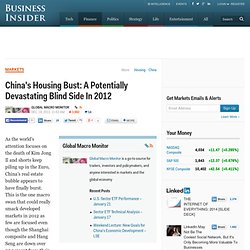
This is the one macro swan that could really smack developed markets in 2012 as few are focused even though the Shanghai composite and Hang Seng are down over 25 percent from their highs earlier in the year. Both are down 21 percent for 2011with Shanghai closing at its lowest weekly close for the year on Friday. Foreign Affairs has just posted a must read piece, China’s Real Estate Bubble May Have Just Popped, which will sound very familiar to Global Macro Monitor readers. If China’s Property Bubble Bursts. The cooling of China’s real estate sector is good for the economy.
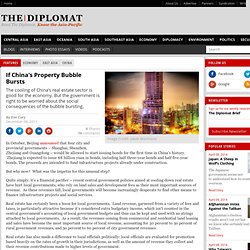
But the government is right to be worried about the social consequences of the bubble bursting. By Eve Cary for The Diplomat December 08, 2011 Facebook0 Twitter0. China's skyscraper craze 'may herald economic crash' China could be the next country to go bust, if its headlong rush to build ever-taller skyscrapers is a guide to its future economic health.
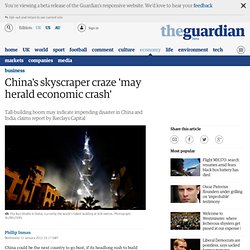
According to a study by Barclays Capital, the mania for skyscrapers over the last 140 years is a sure indicator of an imminent crash. It points out that the construction boom that threw up New York's Chrysler and Empire State buildings preceded the New York crash of 1929 and Great Depression. More recently, Dubai built a forest of skyscraping offices, hotels and apartment buildings, including the world's tallest, the Burj Khalifa, before it got into terrible financial difficulties. In 2010 Dubai had to be bailed out by its neighbour, Abu Dhabi, to avoid going bankrupt. China Soaring Skyscrapers Latest Confirmation Of Housing Bubble, Barclays Finds. China’s inflation bust - macrobusiness.com.au. So then, Chinese inflation is falling precipitously: China's Real Estate Bubble May Have Just Popped.
For years analysts have warned of a looming real estate bubble in China, but the predicted downturn, the bursting of that bubble, never occurred -- that is, until now. In a telling scene two months ago, Shanghai property developers started slashing prices on their latest luxury condos by up to one-third.
Crowds of owners who had recently bought apartments at full price converged on sales offices throughout the city, demanding refunds. Some angry investors went on a rampage, breaking windows and smashing showrooms. Shanghai homeowners are hardly the only ones getting nervous. Sudden, steep price reductions are upending real estate markets across China. The Chanos Equilibrium Will Tell You When China's Financial Meltdown Begins.
At an October seminar of the Chicago Council on Global Affairs (CCGA), carnival economist Niall Ferguson promoted his new book, Civilization: The West and the Rest. He revealed the blindingly obvious as if it were a divine revelation: the U.S. has serious problems. He preached that the U.S. corrupted its six Ferguson-defined "killer apps": competition, science, rule of law, medicine, the consumer society, and a strong work ethic. Ferguson claims India and China have downloaded these killer apps and compares the West with a virus infected PC and the East with a fast Mac. Never mind that competition, science, medicine, trade, and industrious workers have been in evidence in India and China for centuries.
China's Ordos property bust offers warning sign.